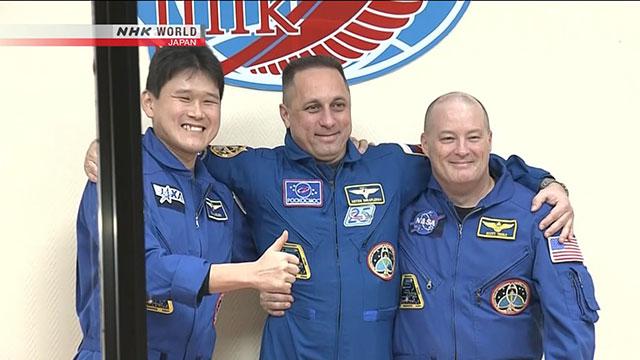A Soyuz spacecraft separated from the rocket about 9 minutes after liftoff from the Baikonur Cosmodrome in Kazakhstan on December 16th.
It entered the Earth's orbit at an altitude of 200 kilometers. The Soyuz is scheduled to dock at the International Space Station on the 19th.
Japanese astronaut Norishige Kanai is a former Maritime Self-Defense Force medical officer. He's the country's 12th astronaut to go into space.
Kanai and his fellow crew members held a news conference ahead of the mission.
"My two colleagues and I have been training for a long time together," he said. "So I feel like tomorrow will just be another day rather than some special event."
Kanai will spend 6 months aboard the space station. He will carry out experiments that look into the mechanisms of Alzheimer's and other diseases.
Kanai will also study how weightlessness and radiation affect the human body.
Ahead of his arrival, the US freight transporter Dragon arrived at the ISS on the 16th. Its cargo included samples and equipment Kanai will use to conduct his experiments.
Applying the thinking of martial arts
"I never thought I would become an astronaut," Kanai says. "I still can't believe it."
Both his parents were pharmacists. When he was a boy, he enjoyed reading stories about voyages to unknown worlds, like 'Twenty Thousand Leagues Under the Sea.'
Kanai is also an avid practitioner of the 'Iaido' martial art. He says the way of thinking he learned from it is useful for an astronaut.
'Iaido' places importance on 'zan-shin,' a state of mind where one is on guard at all times.
"I think it's important to carry out my mission in that spirit," he says. "Even after completing difficult experiments."
Wide-ranging missions
One of Kanai's experiments while at the station may help pave the way for ordinary people to travel to space.
"Space stress" is caused by cosmic rays and weightlessness. He will look at how these conditions affect the body.
The effects can be seen by comparing two sets of mouse bones. One of the mice is kept at the space station for a month, the other remains on earth. When their bones are inspected, the ones of the mouse on the space station look more fragile. This is because a body in weightless conditions creates a lower volume of bone and muscle.
Cosmic rays also cause damage to genes.
Researchers believe a type of protein called "N-r-f-2" may be able to reduce the effects of "space stress."
"Nrf2" has an antioxidant defense mechanism. It creates enzymes thought to help reduce damage to the body.
Kanai will raise two types of mice at Japan's Kibo laboratory module at the ISS. Some were bred without the Nrf2 protein, others will be normal ones.
He will compare the two to find out how effective "Nrf2" is in stopping the deterioration of bone and muscle caused by space stress.
Depending on the findings, the experiment could lead to the development of a drug that activates the protein.
"My dream is to help open up space exploration to everyone," says Kanai.
Education Minister hopes Kanai's work will help space development
Japan's education minister commented on the successful liftoff.
Yoshimasa Hayashi says this marks the beginning of a new era in space exploration, in which Japan will play a leadership role. He says the country will help find common principles for deep space exploration and create a system of international cooperation. Tokyo will host the International Space Exploration Forum in March 2018.
Hayashi says he hopes Kanai will tell the people of Japan and the world of his work at the ISS. The minister says he looks forward to Kanai's work helping advance the future of Japanese space development.
